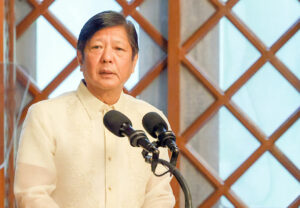DoF chief joins BSP’s Monetary Board

By Keisha B. Ta-asan, Reporter
NEWLY APPOINTED Finance Secretary Ralph G. Recto took his oath as a member of the Monetary Board on Monday, the Philippine central bank said, taking the last seat in the seven-member policy-making body.
Mr. Recto is expected to prioritize inflation while pushing stable economic growth, analysts said.
“He is responsible for National Government debt and taxes,” Jonathan L. Ravelas, senior adviser at professional service firm Reyes Tacandong & Co., said in a Viber message. “He ensures that growth continues by providing inputs to the Monetary Board to help support and stabilize growth.”
Mr. Recto, a former lawmaker who was appointed Finance chief last week, will represent President Ferdinand R. Marcos, Jr.’s Cabinet at the Bangko Sentral ng Pilipinas’ (BSP) highest policy-making body.
The Monetary Board is headed by Governor Eli M. Remolona, Jr., who led Mr. Recto’s oath-taking at the central bank office in Manila, the BSP said in a statement.
The board also has five full-time members from the private sector, namely Benjamin E. Diokno, V. Bruce J. Tolentino, Anita Linda R. Aquino, Romeo L. Bernardo and Rosalia V. de Leon.
Mr. Diokno is Mr. Recto’s predecessor at the Finance department and Ms. De Leon used to be the national treasurer.
Ms. Aquino held key positions at Standard Chartered Bank Manila, Rizal Commercial Banking Corp., Citicorp Investment Bank in Singapore and Citibank N.A. Manila.
Mr. Tolentino was the deputy director-general of the International Rice Research Institute, served as chief economist and country representative at The Asia Foundation and was senior economic policy adviser at the Asian Development Bank (ADB).
Meanwhile, Mr. Bernardo was an analyst for the Philippines at GlobalSource Partners. He used to be a Finance undersecretary and an alternate executive director at the ADB.
Mr. Recto would give the Monetary Board a clear perspective on how monetary policy and banking regulation can support economic growth, China Bank Capital Corp. Managing Director Juan Paolo E. Colet said in a Viber message.
“Immediate priorities should include forming a view on when to cut the policy rate and taking the necessary steps to remove the Philippines from the Financial Action Task Force’s (FATF) ‘gray list,’” he added.
Before his appointment to the Finance department on Jan. 15, Mr. Recto served as Batangas representative and was a deputy speaker of the House of Representatives.
He was a senator for three terms and held key positions including as a minority leader. He pushed higher value-added taxes (VAT) in the Senate in the early 2000.
Luis A. Limlingan, head of sales at Regina Capital Development Corp., said the central bank is already doing a good job in keeping prices stable.
“It will depend on current economic conditions but generally, Mr. Recto should try to help the economy get back to a lower inflationary environment with tools at his disposal,” he said in a Viber message.
The Monetary Board raised borrowing costs by 450 basis points from May 2022 to October 2023. This brought the key interest rate to 6.5%, the highest in 16 years.
Despite the high interest rate environment, the Philippine economy expanded by 5.9% in the third quarter, faster than 4.3% in the second quarter.
For the nine months ended September, economic growth averaged 5.5%, below the government’s 6-7% full-year goal.
Mr. Remolona earlier said it is unlikely for the BSP to start easing policy rates in the first half given risks to inflation.
The central bank sees inflation easing to 3.7% this year and to 3.2% in 2025. Inflation in 2023 was 6%, breaching the 2-4% target for the second straight year.
The BSP will hold its first policy meeting this year on Feb. 15.
The FATF has kept the Philippines under a “gray list” of countries under increased monitoring for money laundering and terrorism financing risks since June 2021.
Government officials expect the Philippines to get out of the gray list in October after failing to meet the January deadline.




